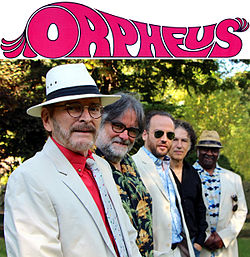History
Orpheus is an American rock band best known for its string of soft rock hits during the late 1960s and early 1970s. The band was formed in 1967 by Bruce Arnold and Jack McKennes, evolving from their earlier folk duo, The Villagers. [4] Orpheus signed with MGM Records and was associated with the ‘Bosstown Sound’ marketing campaign. [5] Orpheus toured with major acts such as Cream, The Who, and Janis Joplin. [6] They had two charted Billboard Hot 100 singles, "Can't Find the Time" was released on MGM Records and reached #80 on the Billboard Hot 100 singles in 1969. [7] “Brown Arms in Houston,” released on MGM Records, charted on the Billboard Hot 100 singles, reaching #91. The song also charted in Canada, peaking at #81 on the RPM Top 100 Singles chart in 1969. [8] [9]
The band’s most notable hit, "Can't Find the Time" became a national success in 1969 and was later was covered by Hootie & the Blowfish for the 2000 film Me, Myself & Irene. [10] Orpheus released several albums under MGM Records, including Orpheus (1968), Ascending (1968), and Joyful (1969), each featuring lush orchestrations and introspective lyrics that set them apart from their contemporaries in the Boston music scene.
Though the group disbanded in December 1969, [11] Arnold reformed Orpheus in 1971 with a new lineup, releasing a self-titled album that year. [12] Over the years, Orpheus has experienced several revivals, performing under names like Orpheus Reborn and continuing to tour and record into the 2010s.
Musical style
Orpheus's music blends elements of pop, jazz, and classical music, with smooth vocal harmonies and richly orchestrated arrangements. Their sound has been described as psychedelic pop, sunshine pop, AM pop, baroque pop, and soft rock. Critics have noted the band’s melodic sophistication and introspective lyrics as defining features of their work, especially in comparison to other acts associated with the Bosstown Sound movement. [13]
This page is based on this
Wikipedia article Text is available under the
CC BY-SA 4.0 license; additional terms may apply.
Images, videos and audio are available under their respective licenses.
